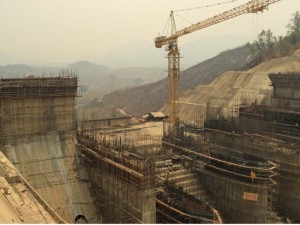Burma’s Ethnic Areas Too Volatile for Foreign Investment
By Burma Partnership • February 25, 2013 In the same week that China announced that the Shwe oil and gas pipeline that runs across Burma will be completed in May, a report from the Transnational Institute and Burma Centre Netherlands, Developing Disparity: Regional Investment in Burma’s Borderlands, warns that foreign investment in ethnic areas has the potential to exacerbate ethnic tensions and disempower local communities.
In the same week that China announced that the Shwe oil and gas pipeline that runs across Burma will be completed in May, a report from the Transnational Institute and Burma Centre Netherlands, Developing Disparity: Regional Investment in Burma’s Borderlands, warns that foreign investment in ethnic areas has the potential to exacerbate ethnic tensions and disempower local communities.
The completion of the 700-mile Shwe dual oil and gas pipeline will conclude the opening chapter of a project that has created a platform for a plethora of human rights abuses. Transporting oil and gas from the Bay of Bengal, the pipeline starts in Arakan State, and passes through Magway and Mandalay Divisions and Shan State, before finishing in Yunnan province, China. While the military controlled company, the Myanmar Oil and Gas Enterprise will gain up to $29 billion over the next 30 years through sale of oil and gas to China, the project has already negatively affected communities across Burma, as the Ta’ang Students and Youth Organization recently documented in Ta’ang areas of Shan State.
The multi-billion dollar pipeline is constructed through politically contested areas that the Burma Army is contracted to protect. The militarization of these areas has caused many villagers to live in fear as reports of forced portering, intimidation and sexual violence against local women, and extortion are common. Developing Disparity highlights how this militarization is also a catalyst for more conflict. This catalyst is not without precedent. The clearest example is in Kachin State, when concessions to Burma’s cronies and Chinese businessmen for jade and timber extraction after a ceasefire was signed in 1994 led to huge environmental degradation, social problems, and economic exploitation. After 17 years of this so-called peace, it is no surprise that the Burma Army and the Kachin Independence Army resumed hostilities in 2011.
Furthermore, construction of the Shwe pipeline, as well as other foreign investments such as the Tavoy Special Economic Zone and the Kaladan Project have contributed to land-grabbing that is endemic in the whole country. Compensation is either very little or it is taken by the military or local administrative authorities. Fear of the authorities after decades of human rights abuses results in little challenge to the corrupt and opaque processes of compensation.
Developing Disparity states that most of the economic benefits of large development projects will not benefit the local communities. Due to “inadequate enforcement and regulation capacity, non-inclusive decision-making processes and limited transparency” development projects in ethnic areas will lead to unsustainable, inequitable development, as elite businessmen and cronies enjoy the wealth created by an abundance of natural resources. As a village head in Shan State pointed out with regards to the Shwe pipeline, “I don’t know what profits my country will get from it. I just know that my family and my neighbors are suffering and starving, and we haven’t seen any money.”
Unless a sustainable peace agreement is in place that includes provisions for equitable resource management that benefits the local communities, foreign investment in resource rich areas will exacerbate ethnic tension and disempower the most vulnerable. Foreign businesses must refrain from investing in the resource rich, yet conflict affected ethnic areas of Burma until a political settlement for peace has been reached. This will facilitate a more sustainable development model that benefits the local communities affected by such investment.
Tags: Armed Conflict, Burma Partnership, Foreign Direct Investment, Investment, Land ConfiscationThis post is in: Blog
Related PostsBurma Army Displays Blatant Disregard for 21st Century Panglong Peace Process
On Union Day, Reappraisal of the Peace Process is Needed
ရွမ္းျပည္တိုိးတက္ေရးပါတီ၊ ရွမ္းျပည္တပ္မေတာ္ SSPP/SSA ထုတ္ျပန္ေၾကညာခ်က္
Time for the Government to Accept the Reality of Human Rights Problems, Take Effective Measures and Move Forward
Kachin Region: War Torn Displaced Village Profiles









 All posts
All posts